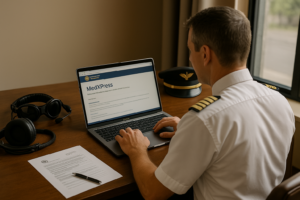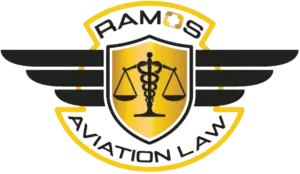FAA Medical Certificate Denial for Mental Health or Cognitive Issues
TALK WITH US TODAYGet the Legal Support You Need: Mental Health & FAA Certification
Being a pilot or air traffic controller is a demanding, high-stress job that can take a serious toll on mental health.
Unfortunately, due to the stigma surrounding mental health in aviation, many pilots and controllers worry about seeking help for conditions like depression, anxiety, ADHD, PTSD, or other mental health issues. However, it’s crucial to recognize that seeking help is a sign of strength, not weakness. As a pilot or controller, your health and safety are top priorities, and maintaining your mental well-being is essential for ensuring you remain medically fit for duty.
If you have received or are considering mental health treatment and need assistance navigating the FAA’s medical certification process, it’s essential to work with experienced professionals who can help you safely maneuver the FAA’s stringent requirements and protect your career.
To get started, try our free MedXPress Simulator, a confidential tool that lets you preview how your disclosures may be viewed by the FAA, with the option to request a consultation or move forward with full legal support.
Additional Practice Areas Listed
- FAA Medical Denial
- Pilot Certificate Actions
- Aircraft Crashes
- FAA DUI Reporting
- NTSB Appeals
FAA Mental Health & Medical Certification
The FAA has strict mental health standards that all pilots must meet in order to obtain or maintain their medical certification, particularly for First-Class medical certificates. Mental health conditions such as depression, anxiety, ADHD, PTSD, or the use of various medications can complicate the certification process, but that doesn’t mean you’re automatically disqualified. From time to time, the FAA updates guidelines for medical examiners and its own policy relevant to medical certification review, which can change the process for pilots and controllers renewing their certification or impact some airmen’s ability to hold a medical. For example, the FAA’s FastTrack initiative aims to streamline medical reviews for pilots with well-managed mental health conditions like depression and anxiety.
Common FAA Mental Health Certification Issues We Handle
- Depression: If you have been diagnosed with depression and are concerned about your FAA medical clearance, we can help. We work with pilots to provide the documentation the FAA needs to demonstrate you are capable of flying safely.
- Anxiety: Anxiety can be a significant barrier to FAA certification, but if your condition is well-managed and you have appropriate documentation, you may still be eligible for medical clearance.
- FAA ADHD Evaluation: ADHD can complicate the certification process for pilots, but with the right evidence and evaluations, a pilot can be approved for medical certification. We can guide you through this process, ensuring that all required documentation is in order.
- FAA Psychological Evaluation: If you are required to undergo a psychological evaluation as part of your medical certification process, we can work closely with your mental health professionals to help present a compelling case to the FAA.
- FAA Mental Health Standards: The FAA sets specific mental health standards that must be met by pilots and controllers, which may include psychiatric evaluations, neuropsychological testing, and comprehensive documentation from treating professionals.
- FAA Psychiatric Disqualification: If you’ve been disqualified due to psychiatric reasons, we can review your case, collaborate with your healthcare provider, and advocate on your behalf to secure the necessary medical certification.
- FAA Medication Approval for Pilots: Certain medications, including antidepressants and ADHD medications, are typically prohibited for pilots. However, some exceptions can be made with proper documentation and evaluation.
- FAA Denial for Antidepressants: If the FAA has denied your certification due to antidepressants, don’t lose hope. We can help you build a strong case to appeal this decision or apply for Special Issuance.
Cognitive Dysfunction & Mental Deficits in FAA Certification
Cognitive issues such as a history of traumatic brain injury (TBI) or mental deficits can complicate your certification process. It is critical to provide detailed documentation about your condition and how you’re managing it. Neurological and psychological testing is often required to demonstrate stability and rule out impairments that could affect flight performance. If you’re struggling with cognitive performance concerns, we can help you navigate these challenges by working with neuropsychologists and other mental health professionals to demonstrate that you are fit for duty.
- FAA Cognitive Dysfunction Certification: If you’re dealing with cognitive dysfunction impairment or a traumatic brain injury (TBI), your FAA certification process will require a thorough evaluation. We can assist you in gathering the necessary documentation and medical opinions to present to the FAA.
- FAA Cognitive Dysfunction Disqualification: In cases of cognitive dysfunction, the FAA may disqualify you from flying. However, with proper evaluations and evidence of stability, you may still qualify for certification.
- FAA Medical Denial for Mental Disorders: If you’ve been denied a medical certificate due to mental health or cognitive reasons, don’t give up. We can help you navigate the process and work with your doctors to prove you’re fit to fly.
Your Path to Regaining FAA Medical Certification
The FAA’s requirements for psychiatric and psychological evaluations can be overwhelming, especially if you’re already managing a mental health condition. Our experienced team is here to guide you through every step of the process. We understand how important your career is to you, and we’ll fight to ensure you receive the medical certification you deserve.
How We Can Help:
- Collaborate with mental health professionals to gather comprehensive documentation.
- Assist in securing and reviewing psychological and neuropsychological evaluations.
- Advocate for you in the FAA’s evaluation process to demonstrate your fitness for duty.
- Provide guidance on the FAA’s specific standards for psychiatric disqualifications and medication approval.
- Represent you in appeals if your medical certification is denied due to mental health concerns.
Don’t let mental health concerns jeopardize your airline career. Contact us today for a confidential consultation. We are dedicated to helping pilots like you navigate the FAA’s medical certification process and advocating for your rights. Let us help you clear the path to your career’s success.
Get Informed: Mental Health in Aviation Video Library
FAA Medical Certificate Frequently Asked Questions
The documentation required for medical certification by the FAA will vary in each case. Oftentimes, the FAA requires pilots with mental health conditions to undergo psychiatric evaluations and provide comprehensive documentation from their treating mental health professionals. In some cases, additional testing, such as neuropsychological evaluations, may be required.
The FAA typically prohibits the use of most antidepressants, but under the SSRI pathway, a limited number of medications—such as fluoxetine, sertraline, citalopram, and escitalopram—are allowed with proper documentation and medical oversight. We can help guide you through this complex approval process.
If your FAA medical certificate has been denied, don’t give up. We can help you gather necessary evidence, work with your doctors, and advocate on your behalf to ensure you have the best chance of receiving approval.
Answer: Yes, it’s possible to retain your FAA medical certificate even with a PTSD diagnosis, as long as you can provide comprehensive documentation showing that the condition is well-managed and does not impair your ability to fly safely. We can help you navigate the process and work with your healthcare provider to present a strong case to the FAA.
Answer: The FAA evaluates mental health conditions based on a detailed assessment of your medical history, treatment plan, and how well the condition is controlled. Depending on the condition, you may be required to submit psychiatric or neuropsychological evaluations and undergo ongoing monitoring. We can assist you in gathering and presenting the necessary documentation to meet FAA standards.
Answer: Many medications, such as antidepressants or ADHD medications, are typically not approved by the FAA. However, the FAA does allow specific drugs—like select SSRIs—under a structured protocol. With the right documentation from your healthcare provider showing stability and no side effects, you may qualify for approval. We can help guide you through this process.
Answer: If your FAA medical certification is denied due to a mental health condition, it’s important to act quickly. We can help by gathering supporting evidence from your doctors, and working to address the FAA’s concerns head-on. A well-documented case can sometimes lead to a successful appeal or a Special Issuance for your condition.
Answer: Yes, pilots with certain mental health conditions may qualify for a special issuance medical certificate. This certificate allows you to fly while meeting additional requirements, such as regular evaluations or submitting updated medical information. We can help you apply for this certificate and/or ensure compliance with that special issuance.
Contact Our Aviation Attorneys
Request a Consultation
MedXPress Simulator
Do You Wish an Attorney Could Review Your MedXPress
Before Submitting to the FAA?
Related Posts

The Pilot’s Guide to FAA MedXPress: Before, During, and After Submission
The Pilot’s Guide to FAA MedXPress For every pilot, from the aspiring student to the seasoned airline captain, an FAA medical certificate is a non-negotiable

Aviation Accident Litigation Challenges
Plane crashes are among the most devastating and complex types of personal injury cases. The intricate nature of aircraft mechanics, multiple parties involved, and strict
Need Help With an FAA Medical Issue? Our Aviation Attorneys Are Standing By.
Your right to fly matters. Let our experienced aviation attorneys help you protect your certification and your future.
